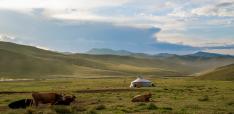Great Game Moves East
Martha Molfetas questions the wisdom of the oil industry’s current search for exploitable reserves.
After turmoil hit Somalia in 1991, oil firms, aid groups, and even embassies evacuated. Now over 20 years on, oil firms are returning. Violence and uncertainty have not subsided, the question of autonomy for Somaliland, devolution of Puntland, and central governmental stability is still uncertain. Al Shabab, terrorist networks, and pirating activities continue to pose a threat in the Gulf of Aden and elsewhere. For all intensive purposes, Somalia is a failed state.
Last month, international oil firms ranging from Norwegian owned Statoil to the Canadian owned Africa Oil Corporation began the process of establishing new mining zones. Many former contracts dating to the 1980’s with BP and Conoco Phillips are currently up in the air since the government that created these contracts no longer exists.
For decades, the oil industry has been aware of the splendors that lie beneath. However, with an increasingly insecure reality above ground, oil industries pose a risk to themselves and to the delicate political balance of the Gulf of Aden and the Horn. Norwegian oil firms interested in Somali offshore mining activities have encouraged Somalia to sign the United Nations Convention on the Law of the Sea (UNCLOS), which would extend their Exclusive Economic Zone (EEZ) to 200 miles off their shore, compared with the twelve miles they currently control. This would mean that Somalia would extend their ability to harness potential reserves, and extend contract rights to firms.
Disputes are currently focused to undetermined maritime borders between Kenya and Somalia. The littoral states have yet to establish clear maritime borders. This might have something to do with the instability both countries have faced in the last 20 years. Earlier this month Somalia accused Kenya of illegally leasing out mining plots to Italian owned Eni and French owned Total oil companies. There are approximately 120,000 square miles of disputed maritime areas between Kenya and Somalia. The UN is currently in the process of facilitating negotiations.
Even if firms are able to develop Somali reserves after overcoming the legal obscurities within Somalia and between Kenya and Somalia, the issue of instability and underdevelopment remain. Current Somali oil development policies, dating back to a bygone era of stability during dictatorship, do not factor in community development through resource profits. Currently Somaliland is planning to drill their first oil wells by 2014, while the government of Somalia plans to go forward with 30 new oil contracts this year. A clear way to mitigate a potential resource curse dynamic would be for these profits to go towards community development, infrastructure, and the general welfare of Somalis at large. Somalia already has a twenty-two year history of civil war and terrorism; the oil dynamic could inject new fuel to the fire. Oil will feed destabilizing confrontations between areas like Somaliland and the government of Somalia, and even autonomous areas like Puntland—in addition to giving increased resources and political weight to areas controlled by Al Shabab. Oil could also give each disputed area the opportunity to leverage interests and create stability to foster development – that is if effective governance were a reality.
This week the UN came out with a report stating that Western oil exploration in Somalia’s disputed areas could ignite further conflict. Key issues of confrontation are between licensing authorities, if semi-autonomous Puntland or Somaliland hands out licenses to areas already licensed out by the central government, oil could become a focal point for renewed civil war and incalculable violence. Oil also offers terrorist organizations like Al Shabab an opportunity to loot resources, seek oilrig workers as hostages, and gain more influence through monetary wealth.
With all of this internal and regional instability, why invest in Somali oil reserves in the first place? In our post-peak reality, the potential rewards outweigh these cataclysmic risks. Harder to harness reserves like Canadian shale oil have seen a sharp increase in development, meanwhile easier to harness oil wells are drying up. Instead of diversifying and creating new ways to harness methane hydrates or renewable energy, the oil industry is clinging to a world that doesn’t exist anymore, a world where climate change and global terrorism didn’t pose an existential threat. Somali oil exploration represents the culmination of post-9/11 insecurities and exacerbating an already sick planet. The ‘Great Game’ has indeed moved East, except this time it’s a battle for global political sanity, oil, and the rest.


